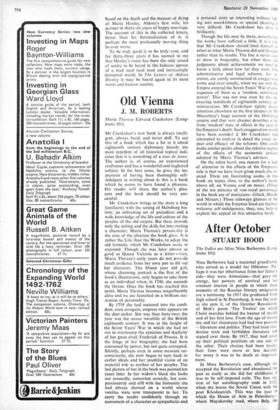Old Vienna
J. M. ROBERTS
Maria Theresa Edward Crankshaw (Long- mans 65s) Mr Crankshaw's new book is always intelli- gent, always lucid, and never dull. To say this of a book which has a lot. in it about eighteenth century diplomacy (surely the most repellent of all historical topics) indi- cates that it is something of a tour de force. The author is, of course, an experienced craftsman and has a wonderful and neglected subject. In the best sense, he gives the im- pression of having been thoroughly self- indulgent in writing about it; this is a book which he seems to have found a pleasure. His reader will share the author's plea- sure and the book should be very suc- cessful.
Mr Crankshaw brings to the story a long familiarity with the setting of Habsburg his- tory, an enlivening set of prejudices and a wide knowledge of the life and culture of the peoples of the old empire. But these provide only the setting and the skills for interpreting a character; Maria Theresa's personality is the core of the pleasure the book gives. It is rather the Life than the Works, to adapt the old formula, which Mr Crankshaw seeks to expound. Though she was later almost as good as Queen Victoria as a letter-ss riter, Maria Theresa's early years do not provide much evidence from her own pen to fill out her character. The fifteen year old girl, whose charming portrait is the first of the book's illustrations, only begins to take form as an individual when, in 1740, she ascends the throne. Once the book has reached this point, Maria Theresa becomes magnificently alive and we are launched on a brilliant rec- reation of personality.
By 1759 she had matured into the confi- dent, even arrogant, empress who appears on the dust-jacket. She was then forty-two; the year was the annus mirabilis of the British eighteenth century. It was at the height of the Seven Years' War in which she had set out to overtrump the cynicism and duplicity of her great rival, Frederick of Prussia. It is the hinge of her biography; she had been coarsened by power, but not quite corrupted. Silently, perhaps even in some measure un- consciously, she now began to turn back to earlier ideals and her youthful vision of an imperial role as mother of her peoples. The last picture of her in the book was painted ten years later. In her widow's black she looks out assuredly, somewhat severely, but com- passionately and still with the humanity she had always showed on a world whose vanities were now transparent to her. To carry the reader confidently through an assessment of a character so sympathetic and a personal story so interesting without fall- ing into mawkishness or special pleading is very difficult. Mr Crankshaw has done it brilliantly.
Though the life may be there, nevertheless the works have suffered a little. It is a pity that Mr Crankshaw should limit himself so often to what Maria Theresa did and thought rather than its results. The line is never easy to draw in biography, but when there are judgments about achievements we need to know a little about how far they went. I he administrative and legal reforms, for in- stance, are surely summarised in exaggerated terms and over-simply, when we are told the Empire entered the Seven Years' War in con- sequence of them as a 'modern, centralised power'. This was not true even by the un- exacting standards of eighteenth century ad- ministration; Mr Crankshaw rightly dra %ss attention elsewhere to the first chapter of Mr Macartney's huge account of the Habsburg empire and that very chapter describes a far from 'modern' state of affairs in the year of the Empress's death. Such exaggeration would have been avoided if Mr Crankshaw had attempted to explain in detail the exact im- pact and efficacy of the reforms. One could make similar points about the relative neglect of the effects of the economic policies adopted by Maria Theresa's advisers.
On the other hand, one reason for a lack of attention to the effects of the Empress's rule is that we have been given much else in- stead. There are fascinating asides in this book on topics close to the author's heart, above all, on Vienna and on music. (Three of the ten pictures of non-royal personages in the book are of musicians—Gluck, Haydn and Mozart.) These sideways glances at the world in which the Empress lived are further, welcome self-indulgences; they, too, help to explain the appeal of this attractive book.










































 Previous page
Previous page